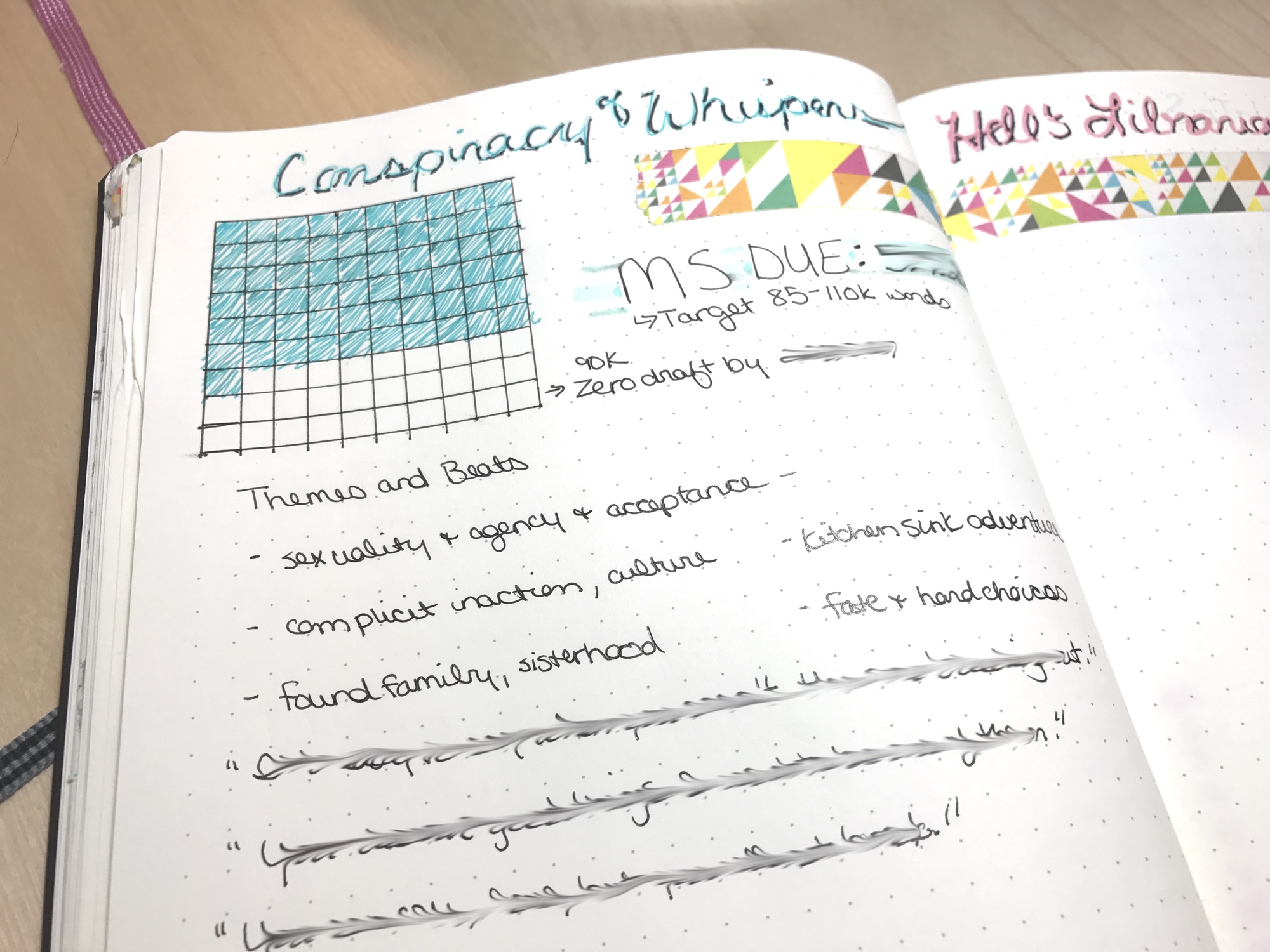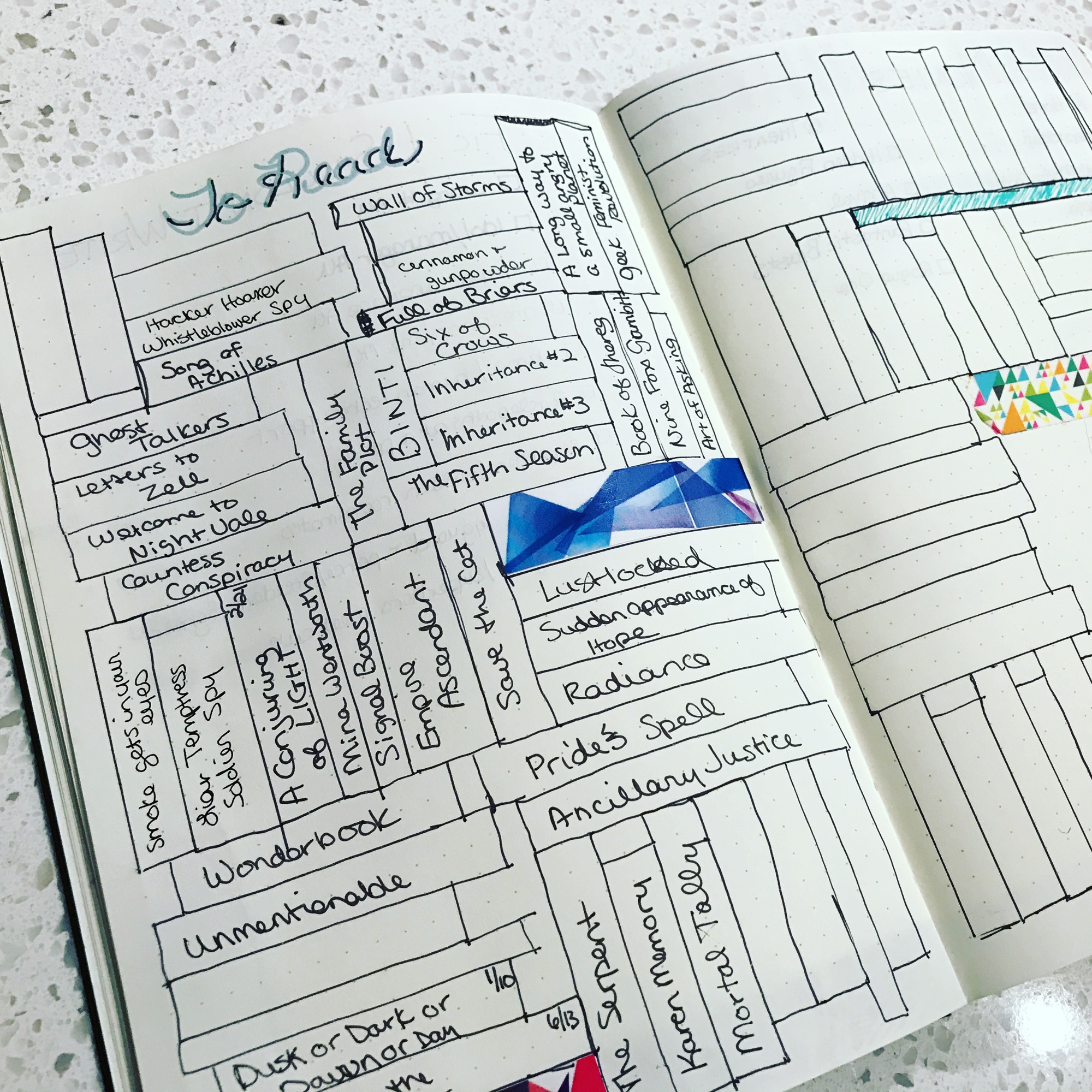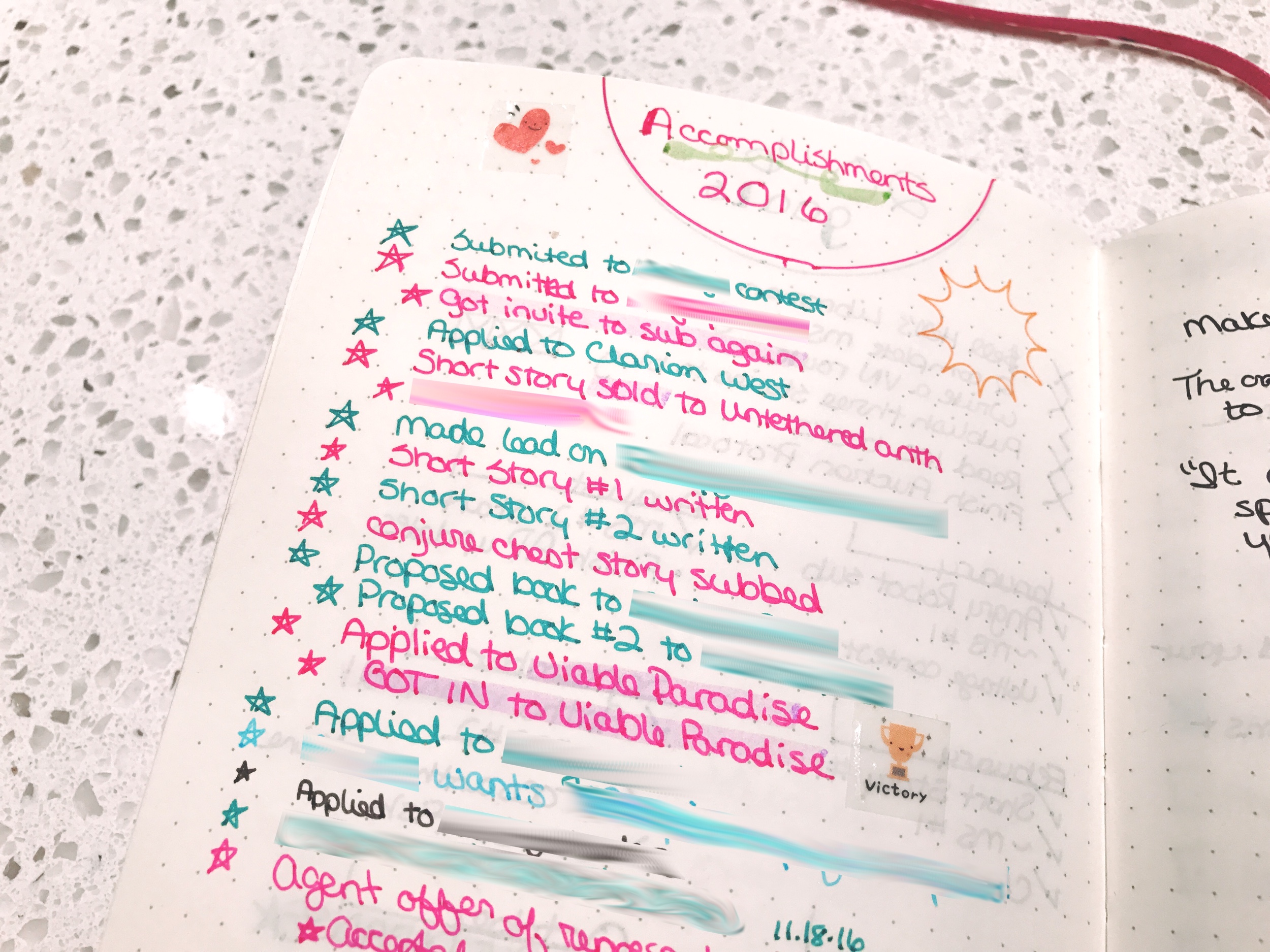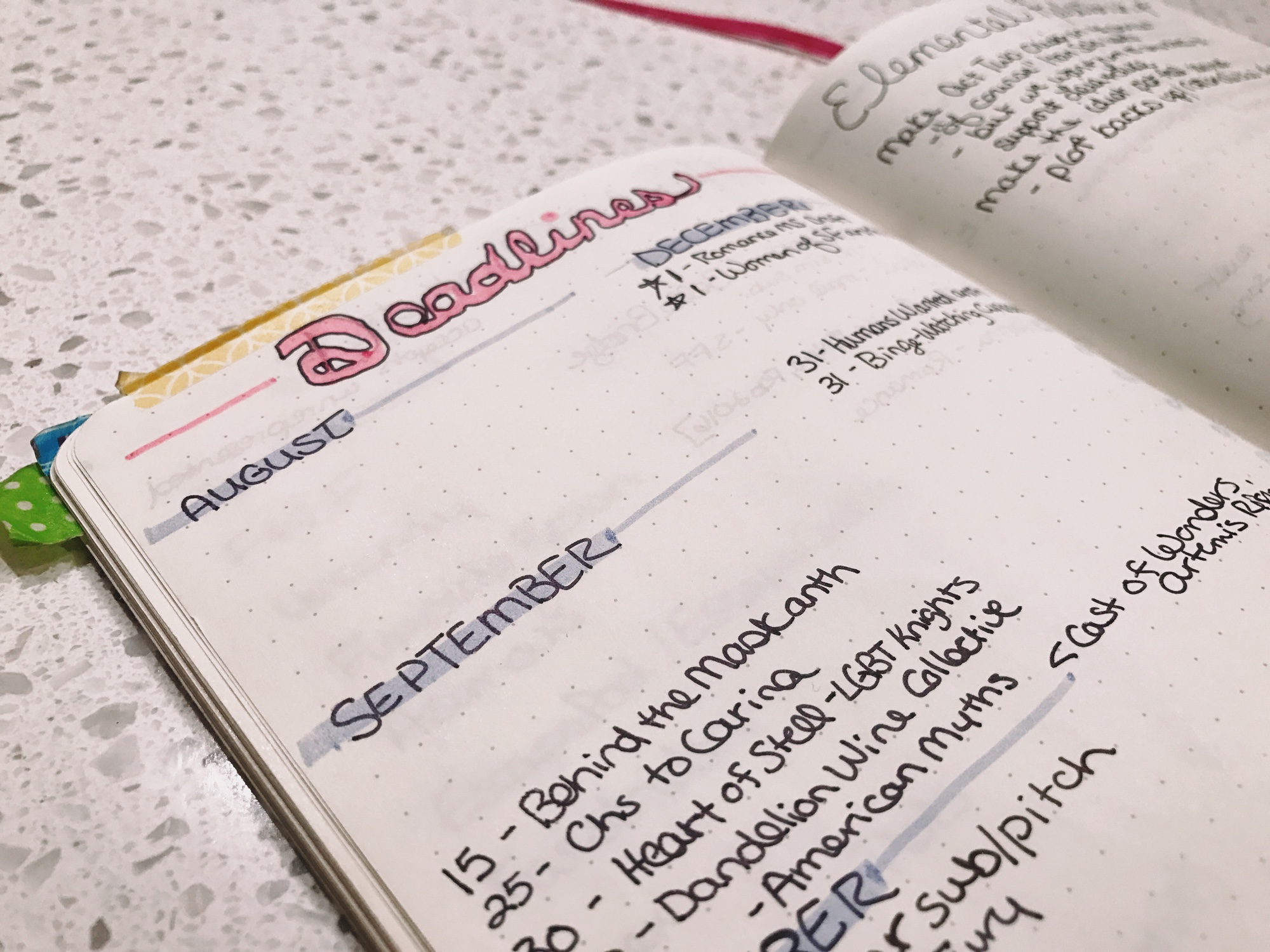A lot of writers are doing end of year publishing or awards eligibility round-ups this time of year. While I'm not quite to that point yet, what I am doing is gearing up for some really exciting writing projects and setting up my new year bullet journal to keep track of all the plotting.
I loved bullet journaling when I started puttering with it last year, but it took me a while to figure out the custom set-up that works for my freelance, writery needs. The bullet journal community has a huge amount of friendly instagram and tumblr feeds with photos of people’s journal set-ups (much prettier than mine) to help you get started. But the majority of examples I found were generally either students with a schedule full of classes and assignments, or women with a busy family life and multiple commitments.
I’m neither of those. I mean, I have commitments, but they’re generally to saintly editors and fictional characters with death wishes. The life of a writer means I have a hundred things to keep track of at once, but not always on a precise day by day itinerary. If I stuck to to the traditional appointments + daily to dos format, my days would be a constant repeat of something like “Write word count, Edit X, read, check email anxiously.”
Which is accurate but not really inspiring or motivating.
So I stumbled my way through a few tweaks to the bullet journal set-up with the writer brain in mind, and some writing-specific pages that help me keep my projects straight. It seemed the time of year for setting up plans, so I decided I'd share how my journal is set up, what works (for me) and what doesn't.
What didn't work for me
I'll get this out of the way first: a lot of the spreads in the starter bullet journal tutorial were just wasted space for me. My bullet journal does not look like most bullet journals. Writing wise, I'm working on large, multi-month projects and while I have milestones I'm trying to hit, those tend to occur on the week or month scale, not daily. Personally, Levi and I keep a pretty chill, child-free lifestyle and manage the occasional appointments and social plans through a shared Google Calendar.
I still use the basic bullet journal structure from the tutorial: an index, a future log, threading and color coding. I still use a weekly spread for to-dos, but since I’ve begun to migrate so many of my daily to-dos to Habitica, I might change that up in the future too. Past that, my set-up gets pretty writer-specific. I'll try to limit myself only to writer-specific tweaks and additional pages here.
Year Goals
The usual bullet journal set-up has a year goals spread, but I had to narrow mine creatively. Figuring out what I want or need to accomplish, creatively, at the beginning of the year helps me keep my twitchy muse on track. I usually try to include an experience goal (input), at least one production goal, a stretch goal, and a fun goal. For 2017, that is shaping up looking like:
- Read 100 books
- Write & finish two novel manuscript drafts
- One blog post a month
- Write a demo or short IF
- Attend two cons
- (try not to panic)
Notice these are all things that are in my control. I have things I would like to have happen this year, sell another book, become a jedi, but I don’t necessarily have control over whether that happens or not. I try to keep focused on goals that mostly rely on my efforts, not outside luck or forces beyond my control. Focusing on those things, fame, success, is crazy-making but so easy to do. I still struggle with it.
Accomplishments
I’m going to take a minute to convince you of the therapeutic benefits of bragging to yourself. Let’s be honest, a writing career is solitary and full of amorphous feelings of progress. I try to acknowledge progress by keeping a totally indulgent accomplishments page. It gets added to every time I publish or sell something, sure, but I also include accomplishments that are in my control: when I submit to Big Scary Thing, or just finish Draft That’s Been Kicking My Butt. It’s a good thing to have and look back on during those days when impostor syndrome is kicking your butt or you’re feeling anxious about your progress.
Look! Even a trashfire year like 2016 can look better with a colorful list of bullet points.
some text blurred for Reasons(tm)
Manuscript Status Page
Every manuscript I work on gets an official status page in my journal. This isn’t the page that will hold EVERYTHING about the book (that’s a series bible and a totally different project for me), but I make a little grid to color in as a progress through the first draft, include important deadlines and due dates, and include a few notes on the themes of the book and central Big Ideas I don’t want to forget during the swampy middle of drafting. It’s a page I check into occasionally, to update or just remind me why I wanted to write the book in the first place.
Bonus: filling in those 1k squares is very satisfying.
Writer Toys and Tools pages
Honestly, these lists fill up the bulk of the front of every bullet journal I start. Some of the most useful pages for me are the pages where I keep running lists of ideas, notes, concepts that I want to work into a story someday. Just a few of these pages include:
- Short story ideas or prompts — niggling ideas or stories I want to write someday. If I need a small project or inspiration for a short story exercise, I turn here.
- Blog articles or tumblr posts — Ideas for blog posts and articles that I will probably not get around to writing because I’m a bad blogger, but it feels good when I get to check one off.
- Fanfic ideas - Because I’m a nerd and fanfic is awesome. (I separate these ideas from short story ideas, because they tend to be more situational—not sure why.)
- Name lists—feminine names, masculine names, non-gender specific names, family/place names, creature names, and so on.
- Character tells - little ‘how does your character respond’ opportunities ('i.e., “is your character the type of person to strike up a conversation with a wrong phone number?”) that I can use in future stories
- Archetypes - Archetypes is totally the wrong word, but I keep a page of ‘general types of characters or character ideas I haven’t written yet but would like to some day.’ Whenever I see a character in a movie or series that’s awesome, I try to a) figure out the essence of the personality and what makes it so interesting to me and b) sketch that down so I can play with it in the future. These are really just crumbs of a type than full characters (e.g., someday, I want to include a ‘cinnamon roll Slytherin-esque character' or 'lovable scammer-mentor a'la Reigen from MP100').
- Word morgue - specific words, turns of phrase, or descriptive whatevers that I stumble on and I want to seed into my writer brain for use in the future. Usually this is precious poetic darlings that get killed/edited in current drafts but could be revived in the future. Or just a fun word. Words are fun.
- Writer lies - Writer Lies, if you aren't familiar, are lies writers tell themselves in order to get through a draft, project, or writing sprint. Love and cherish your writer lies. It’s the lies we force ourselves to believe in order to shut down the internal editor/slacker and get to the bravery and business of writing. I keep a list of mine to remind myself on those days when it’s just really, really hard to believe in what I’m attempting.
- Seed pages / Notes - A snatch of dialogue. A great quote. An urban myth or biology factoid about herbivore vs carnivore behavior. If it’s something useful that might fit into a plot someday, it goes on these pages. Notes from any talk, article, or documentary go in here too.
- Plotting - I use a lot of pages trying to convert a jumbled list of scenes/events into an orderly chapter list with firm POVs.
- Industry stuff! - Short story markets by genre. Publishers or agents. Awards deadlines. Workshop deadlines. Etcetera and so on.
Tracking
Your mileage is going to vary on this. Tracking stresses out some people. I don't like tracking habits, but I love tracking things. I track books, television shows, manga, writing habits, etc. It is a fun way to look back on the year, and also it helps me remember to do things other than work when my writing is starting to drag.
- Words written - I tried a couple different ways to do this, but eventually settled on just ticking boxes on my weekly page for every 500 words I wrote. I want to try a more dedicated format that would let me figure out the time of day/environment/etc that I write best in, but filling a tiny word count gauge is enough for now.
- Books to read - Because of course. I also track these on GoodReads but I like having it in my notebook. This year I set a goal of 100 books to read and am slowly coloring in book-ish rectangles (because I can't draw).
- Fanfic read - Last year, I realized I set goals for books to read, but any fanfic I read was lost to the ether. This year I wanted to track the really, really good fanfic I read. Useful for future recommendations.
- Even more media pages - Pages for television series, movies coming out, video games, visual novels, manga, podcasts, etc. I go a little over-board with it, but I enjoy seeing at the end of the year what I liked or didn't. Also helps for when friends ask for recommendations later.
Your Mileage May Vary
Advice on bullet journals and, of course, writing is highly variable but there you go. The coolest thing about the bullet journal set up is flexibility--try a layout or list and it doesn't work? Try something else on the next page. Ultimately, the best system is whatever gets more words down on the page, and I'd be psyched to hear what's worked for you.





